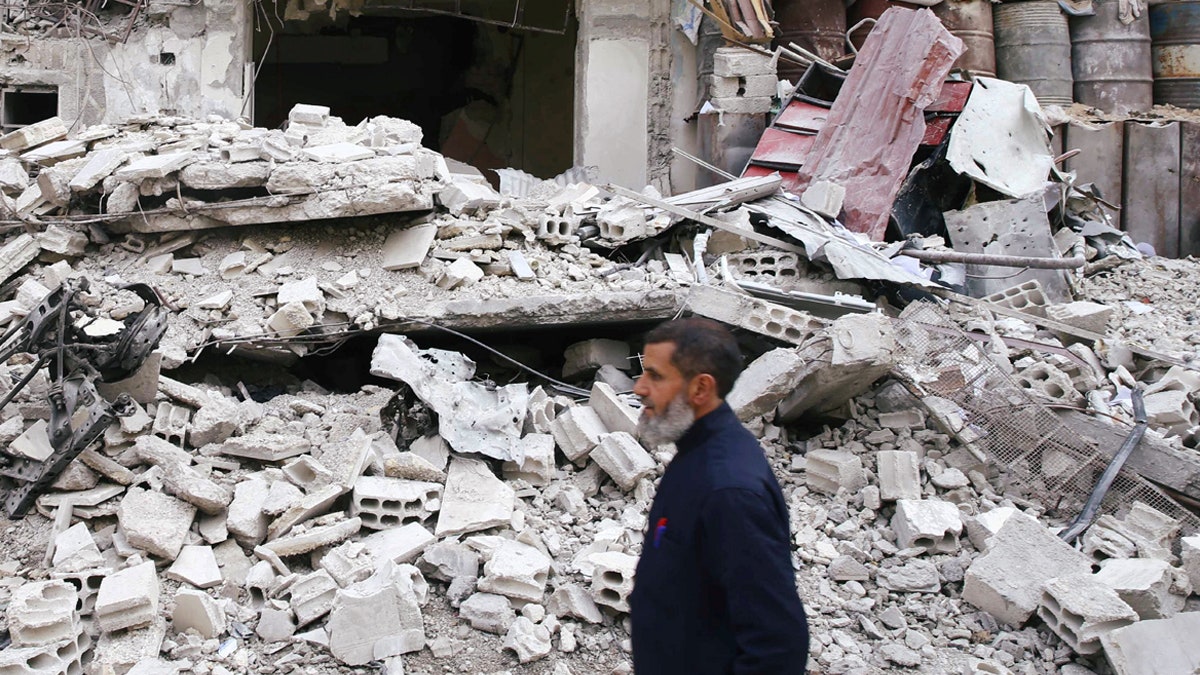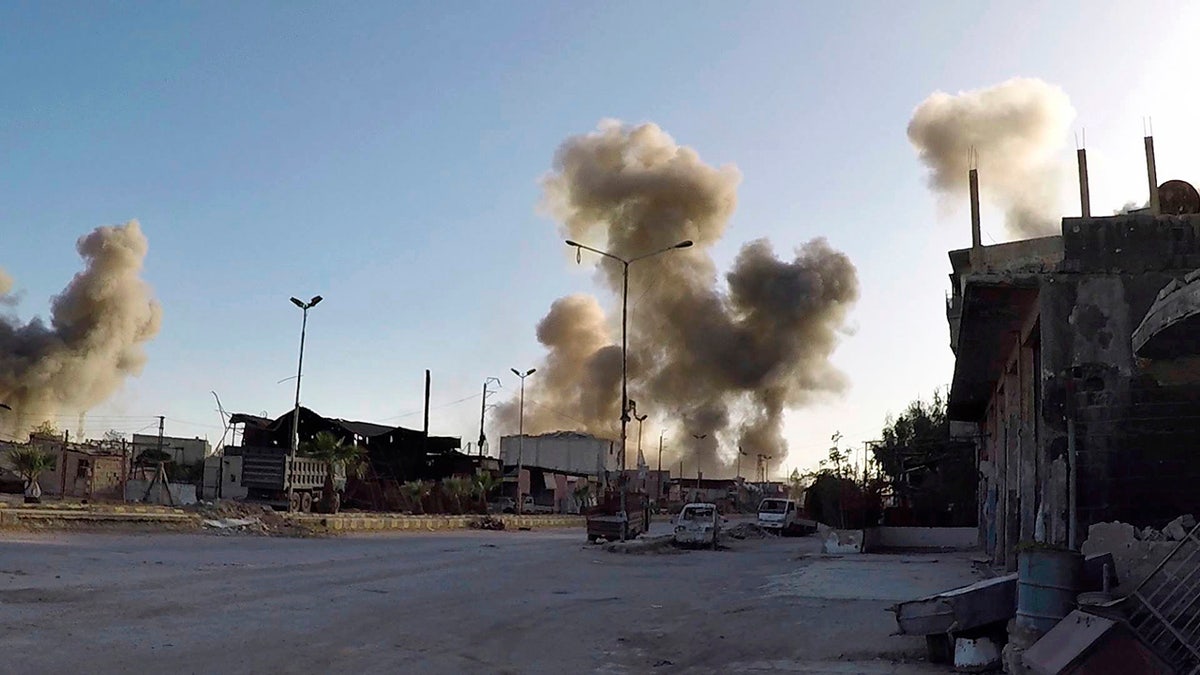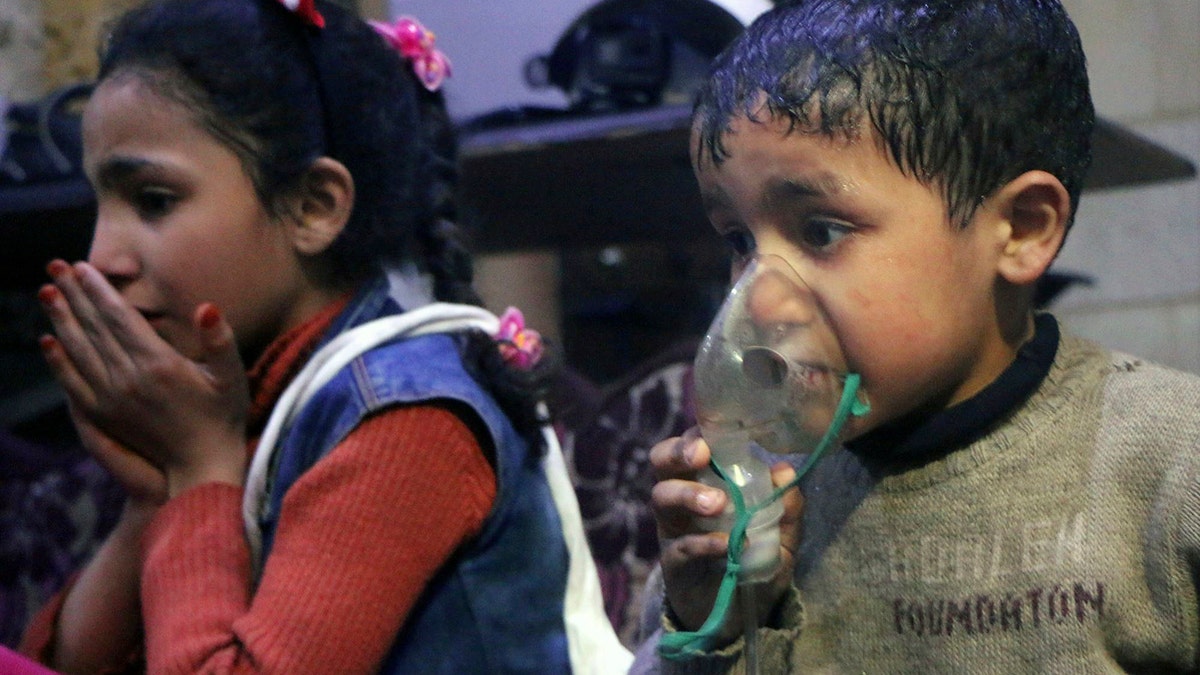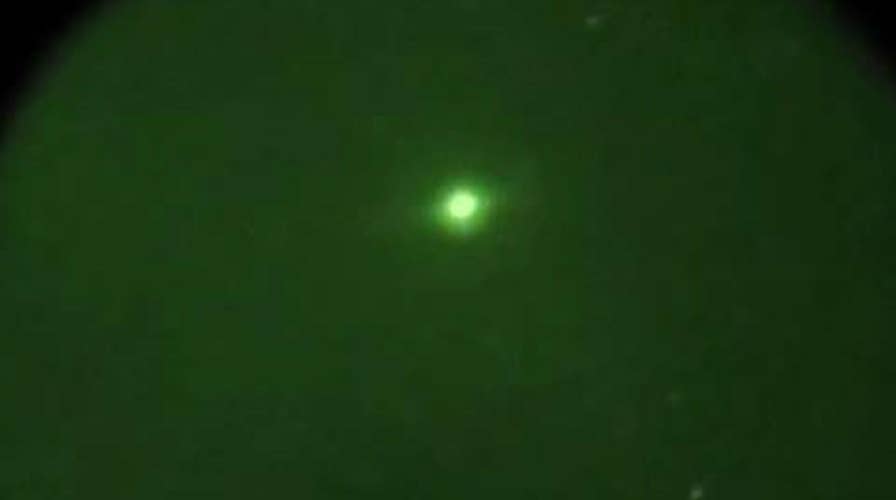Syrian media release video of response to strike
Night-scope footage purportedly shows surface-to-air missiles over Damascus.
MANBIJ, Syria – Obada Alstof, a 21-year-old opposition activist from the northern countryside of Homs, was woken up with a loud jolt and tremor in the early hours of Saturday morning.
It came as a welcome surprise.
“The explosions were so loud,” Alstof told Fox News in the immediate aftermath. “We had no idea what was happening but we immediately expected that the international coalition was targeting the regime locations.”
The United States and its allies wasted little time before retaliating against the Bashar al-Assad regime over its use last week of chemical weapons, sending bombs raining down at a former missile base - some 15 miles west of Homs. That's where the regime is believed to keep chemical-weapon precursors stockpiled -- in violation of the Chemical Weapons Convention.
According to Pentagon officials, a number of facilities were struck: a chemical weapons storage facility; a chemical weapons equipment storage and crucial command post near Homs; and a scientific research facility in Damascus, believed to be key in the production of chemical and biological weapons.
Alsatof lives just miles from the Scientific Research Center in the western countryside of Homs, in a rebel-held area besieged by Syrian forces.
What will happen next?
Immediately after the U.S.-led strikes, those in the neighborhood started calling one another and speculating on what would happen next.
“We hope for the future that strikes will expand to include all the Syrian regime and its supported militias’ military locations," Alstof continued, "because the regime and its allies are committing massacres against the civilians every day.”
“We hope for the future that strikes will expand to include all the Syrian regime and its supported militias’ military locations, because the regime and its allies are committing massacres against the civilians every day.”
Others were wrought with mixed emotions.
“Early morning today, I woke up because of the sound of Syrian anti-aircraft. I did not see the explosions but I heard the sounds,” Zilal Mansour, a 33-year-old in Damascus, recalled. “These were weaker compared to the sounds of shelling in Al-Ghouta, although I knew that military area near my residential ‘Barza’ was being targeted.”
Mansour said she didn’t feel any shaking, but was left with a kind of emptiness that comes in the heat of long and arduous war.

Syria's long conflict has taken a heavy toll on the civilians who have remained in the country.
“I did not feel anything, I was not sad or happy. Assad should be punished,” she said. “But would this strike be like the previous one? Or is it for pressing him for political concessions?”
Meanwhile, Said al-Hamawi, 20, a business student at a private Damascus university, said he saw a rocket shoot across the sky around 5:30 a.m., heading from the west to the northeast before being hit by Syrian anti-aircraft defense mechanisms.
“It exploded in the sky. It was very clear. There were far explosions in the sky, but that was the clearest,” Hamawi recalled. “I hope that this attack will achieve almost Assad's weapons destruction, whıch will rid the Syrians civilians of weapons that will be used against them.”
"We don't want to see our people killed'
Further north in Syria from Kobane to Manbij, currently under control of the U.S.-backed Syrian Democratic Forces (SDF), news of the strikes was met, overall, quite favorably among locals, who still deeply fear retaliation from the authoritarian regime.
“If we know the U.S. will stay here long-term to protect us, it is no problem, we can speak freely,” one local explained in Manbij. “But until then, we don’t know what will happen. We don’t want to see our people killed in retaliation. The situation is too sensitive.”
Nonetheless, others were quick to indicate that the strikes were less effective than they could have been. Reports from within Syrian regime territory claimed that advance warnings from Russia gave them leeway to evacuate the bases, and furthermore, insist several of the missiles were shot down.

Smoke rises from the site of last week's chemical weapons attack in Douma, Syria.
“Assad during the previous days transferred many aircraft and weapons from their places to another one. Most of the targeted areas were empty and only the building has been damaged,” Ayman Bakla, 53, a retired worker in Damascus, lamented. “Assad came out on the television a little while ago, going to his office with a message to the world that ‘I am fine and your beating did not affect.’”
Mansour too noted that a few days prior to the attack, when escalations were brewing, many people aligned with Assad thought that if the American strike had happened, it would be like the previous one and that Russia would protect them -- so they opted to “not take it seriously.”
The strike has also provided a propaganda opportunity for Syrian government loyalists.
'It is time to be judged'
On Saturday morning, regime supporters were encouraging each other to gather near Umaween Square, near the Syrian television building, to “declare their victory over the American aggression.”

Children are seen in Douma, Syria, following last week's chemical weapons attack. ( )
Several people in opposition areas within Damascus indicated that the response paled in comparison to the level of shelling inflicted on the Ghouta area by regime and Russian forces.
Yet the symbolism of striking back is a potent one.
“The Assad regime has continued using chemical weapons on Syrian people, causing unlimited murders at the expense of Syrians. It is time to be judged for the crimes,” Firas al-Marhoum, an Eastern Ghouta-based youth and human rights activist, said. “I hope the global coalition will do more strikes on the Assad regime to punish it for his murders. I hope these strikes will not stop until Assad’s departure.”
“I hope the global coalition will do more strikes on the Assad regime to punish it for his murders. I hope these strikes will not stop until Assad’s departure.”
While it remains to be seen what happens next, Syrians are hopeful of a newfound resolution.
“The U.S. will push to accelerate the Geneva process to reach a political solution in Syria,” Ayman Abdel Nour, founder of Syrian Christians for Peace, and a key player in Washington and opposition dialogue, said regarding the conflict. “Russia asked to reduce the strike in order to keep its face, in exchange to push for a real political solution, which requires Assad to be out.”





















